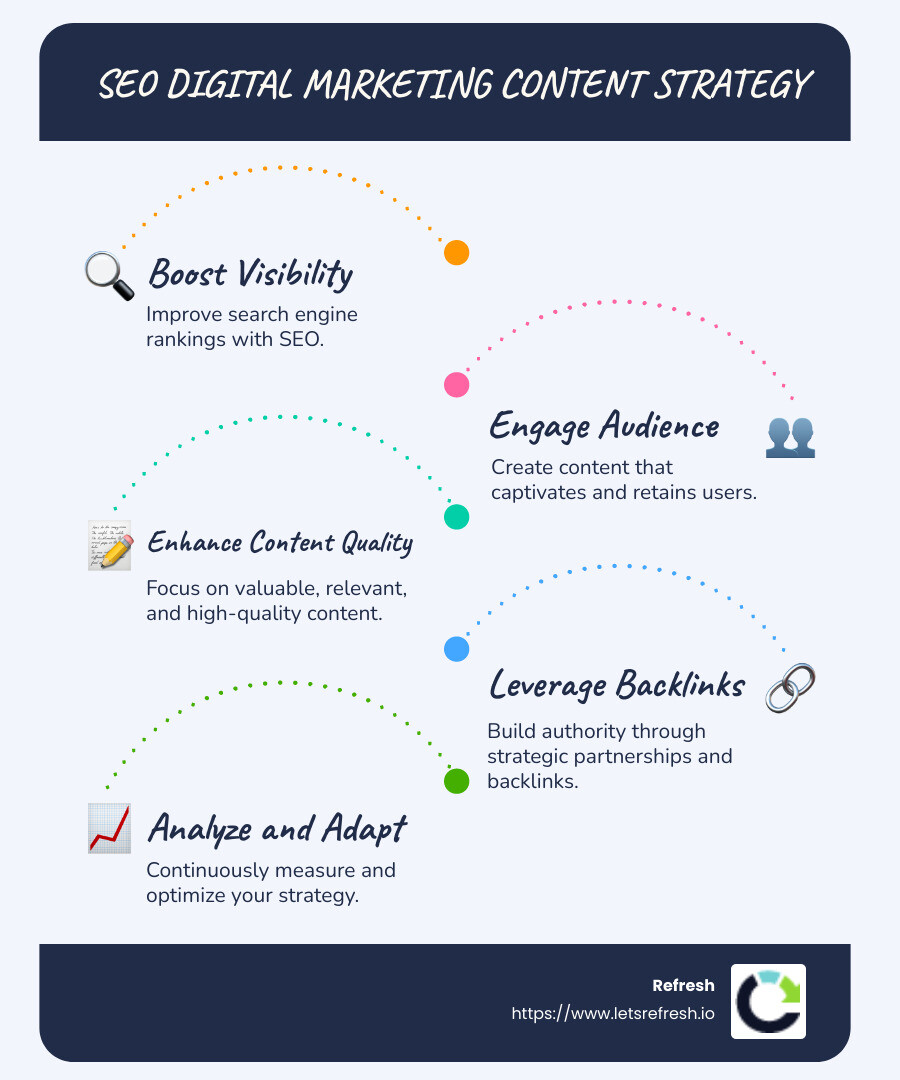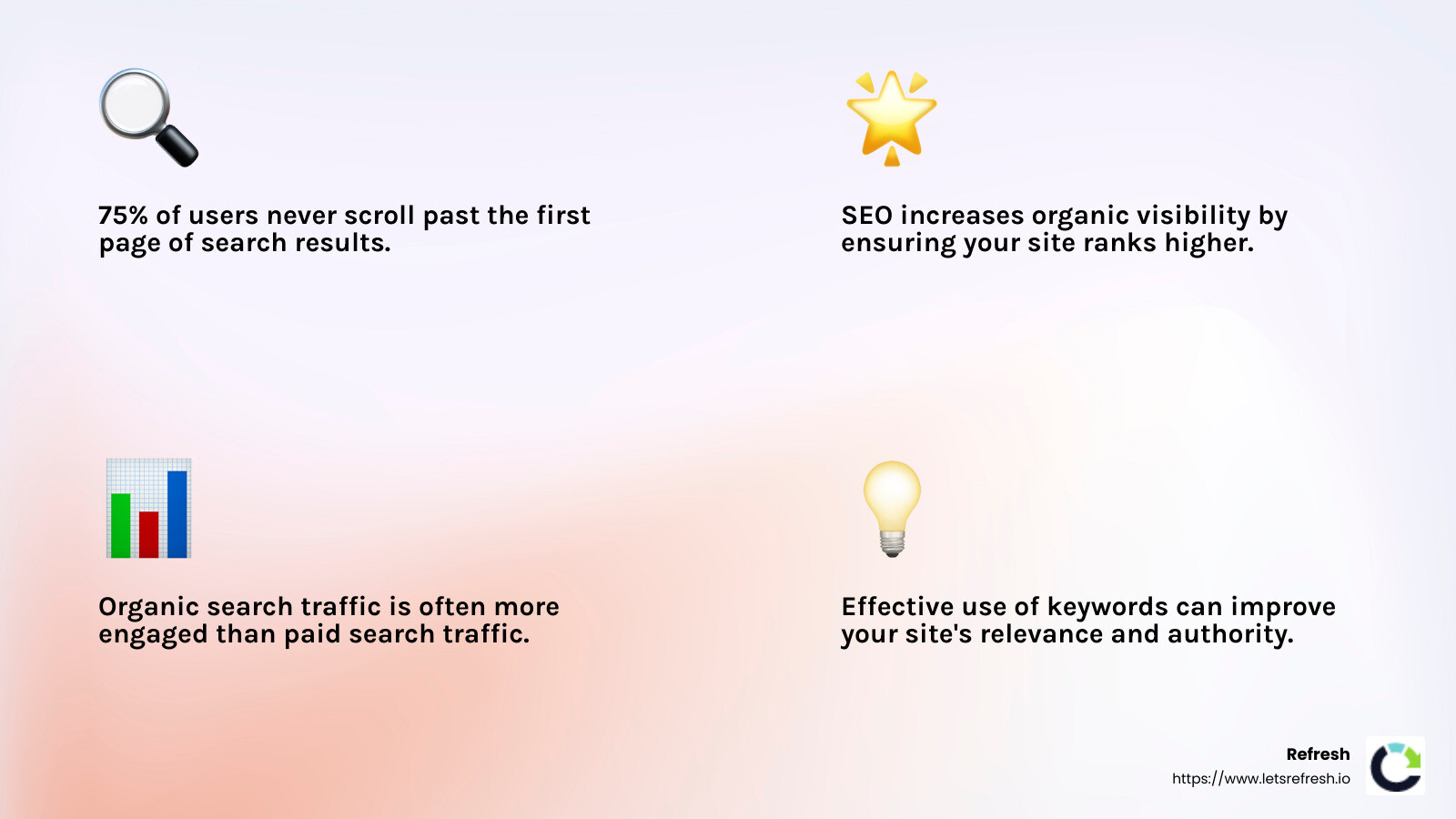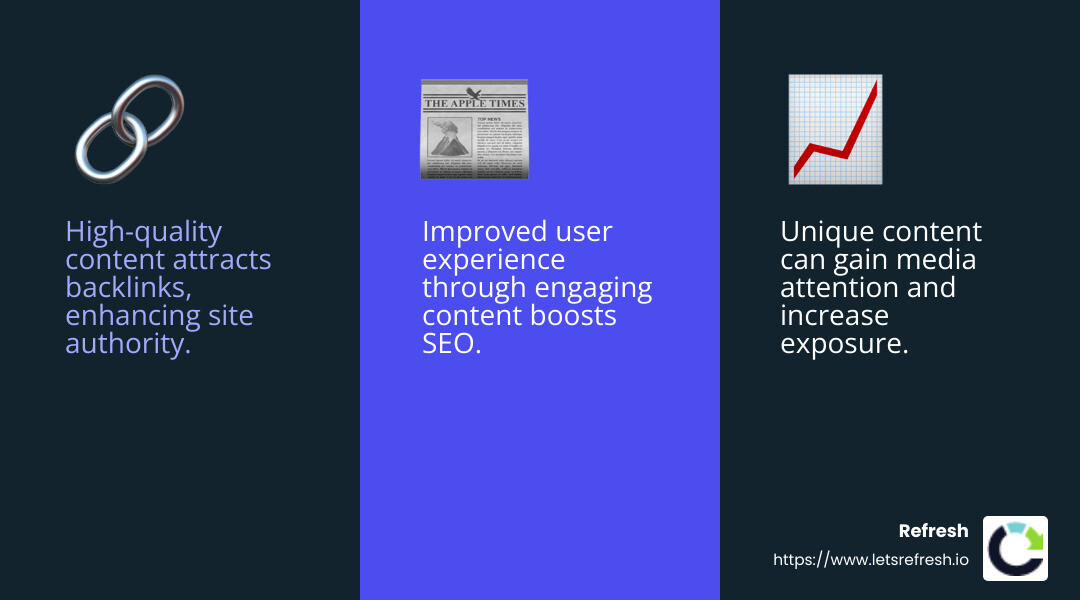July 24, 2025
SEO digital marketing content strategy is the backbone of any thriving online presence. It's how brands ensure that their websites are not just seen by potential customers but also engaging enough to drive action. In our digital world, it's more important than ever for businesses to amplify their online visibility through strategic SEO and content marketing efforts.
To quickly grasp the essentials:
- SEO boosts your site's ranking in search engine results.
- Digital marketing helps expand your reach and engage with your audience.
- Content strategy involves creating valuable content that meets your customers' needs and improves engagement.
I'm Alexander Palmiere, and for years, I've helped businesses like yours improve their digital footprint with targeted seo digital marketing content strategy techniques. My team and I have developed over 200 websites, utilizing strategic digital approaches that boost visibility and customer engagement. Let's dive deeper into how a well-planned strategy can transform your digital landscape.

Quick seo digital marketing content strategy definitions:
- how to use seo in your digital marketing strategy
- what is seo strategy in digital marketing
- why is seo important in a digital marketing strategy
What is SEO?
Search Engine Optimization, or SEO, is the art and science of enhancing a website's visibility on search engines like Google and Bing. At its core, SEO is about making sure that your website can be easily found by people searching for information, products, or services that you offer.
Why is SEO crucial? Because it directly impacts how much organic traffic—visitors who find your site via unpaid search results—your site receives. The higher your site ranks on the search engine results pages (SERPs), the more likely it is to attract clicks and visits.
Let's break down the essentials of SEO:
- Search Engines: Think of search engines as librarians. When you ask a question, they look through their vast index of the web to find the most relevant and authoritative answers. SEO ensures your website is among those answers.
- Visibility: Visibility is about being seen. The goal of SEO is to make your website appear at the top of the SERPs. This is crucial because the majority of users don't scroll past the first page of search results.
- Organic Traffic: Organic traffic is gold in digital marketing. It's cost-effective and driven by user interest. Unlike paid ads, which stop driving traffic once the budget runs out, good SEO keeps bringing in visitors over time.

How SEO Works
SEO involves several components:
- Keywords: These are the words and phrases people type into search engines. Identifying the right keywords is essential to attract the right audience.
- Content: High-quality content that answers users' questions is more likely to rank well. This is why content marketing and SEO go hand-in-hand.
- Technical SEO: This includes optimizing your site's architecture, speed, and mobile-friendliness to ensure search engines can crawl and index your site effectively.
- Backlinks: Links from other reputable websites to yours signal to search engines that your site is credible and worth ranking higher.
SEO is not a one-time task. It requires ongoing effort and adaptation to stay ahead in the changing digital landscape.
In the next section, we will explore how content marketing complements SEO to create a robust digital marketing strategy.
What is Content Marketing?
Content marketing is a strategic approach focused on creating and sharing valuable, relevant, and consistent content to attract and engage a clearly defined audience. Unlike traditional advertising, which often interrupts, content marketing aims to provide content that people seek out and enjoy.
Why is content marketing important? It's a game-changer for businesses. It builds brand awareness, fosters audience engagement, and improves search engine optimization (SEO). Plus, it's budget-friendly, making it a perfect fit for small businesses looking to make a big impact.
Audience Engagement
At the heart of content marketing is engagement. It's about starting a conversation with your audience and keeping them interested. This is crucial because engaged audiences are more likely to become loyal customers.
Consider this statistic: as many as 74% of businesses report that incorporating content marketing increases their leads. This shows how effective content marketing can be in driving business growth.
Types of Content
Content marketing can take many forms, each with its unique way of engaging audiences:
- Blog Posts: These are great for sharing insights and expertise. They help establish your brand as an authority in your field.
- Videos: Perfect for storytelling and capturing attention quickly. Videos are highly shareable and can reach a wide audience.
- Podcasts: Ideal for reaching audiences on the go. They offer a personal touch and can build a loyal listener base.
- Infographics: These visually appealing graphics simplify complex information, making it easy to digest and share.
- eBooks: Provide in-depth knowledge on a topic. They are excellent for capturing leads through downloads.
- Interactive Content: Includes quizzes, polls, and calculators that engage users actively.
Examples of Content Marketing
Let's look at a real-world example. McKinsey & Company, a management consulting firm, uses content marketing effectively. They create articles and downloadable assets like eBooks on emerging technology trends to appeal to their audience. This not only showcases their expertise but also engages their target market.
Another example is NerdWallet, which ranks highly on SERPs for terms like "starter credit cards" by providing valuable and informative content. This strategy not only boosts their SEO but also draws in organic traffic.
Content marketing is more than just creating content; it's about crafting a strategy that aligns with your business goals and resonates with your audience. When done right, it can transform how your brand connects with its audience.
In the next section, we'll dig into how content marketing and SEO intersect to form a powerful digital marketing strategy.
The Intersection of SEO and Content Marketing
When SEO meets content marketing, magic happens. These two strategies, when combined, create a powerful force that can transform your digital marketing efforts.
Synergy Between SEO and Content Marketing
Think of SEO as the technical backbone and content marketing as the creative soul. Together, they improve each other's strengths. While SEO ensures your content is findable, content marketing ensures it's valuable and engaging. This synergy is crucial for building a successful online presence.
Benefits of Combining SEO and Content Marketing
The benefits of merging SEO and content marketing are vast. For starters, this combination boosts your website's visibility. High-quality content optimized for search engines can climb SERP rankings, attracting more organic traffic.
But it’s not just about visibility. Engaging content keeps visitors on your site longer, reducing bounce rates and increasing the chances of conversion. Engaged users are more likely to share your content, expanding your reach even further.
Enhancing Visibility and Engagement
SEO and content marketing together improve both visibility and engagement. By using researched keywords in your content, you increase its chances of being found by those who are actively searching for it. This targeted approach means your content reaches the right audience, leading to higher engagement rates.
When users find your content valuable, they interact with it more. This interaction signals to search engines that your content is relevant and useful, which can further boost your rankings.
The Role of Backlinks
Backlinks are a critical component of off-page SEO, and content marketing plays a key role in earning them. High-quality content naturally attracts backlinks from other websites. These links act as votes of confidence, signaling to search engines that your content is trustworthy and authoritative.
For instance, when a notable publication references your content, it not only increases your site's authority but also drives more traffic your way. This can lead to more branded search queries and a stronger online presence.
Case Study: Internal Linking Success
An effective internal linking strategy can also amplify your SEO efforts. Consider this example: a user in the beta phase of Beki AI reported an 800% increase in clicks after improving their internal linking. This strategy not only guides users through your site but also helps search engines understand the structure and relevance of your content.
In summary, the intersection of SEO and content marketing is where digital marketing success truly begins. By leveraging the strengths of both, you can create a strategy that improves your visibility, engages your audience, and builds authority through backlinks.
Next, we'll explore how to create an effective SEO digital marketing content strategy to harness this synergy.
Creating an Effective SEO Digital Marketing Content Strategy
Crafting a successful SEO digital marketing content strategy involves several key components. From keyword research to technical SEO, each element plays a crucial role in ensuring your content is both visible and engaging.
Keyword Research
Keyword research is the backbone of any SEO strategy. It helps you understand what your audience is searching for and how to meet their needs. Using tools like Ahrefs or Semrush can streamline this process by revealing popular search terms and their competition levels.
Focus on long-tail keywords—these are more specific and often less competitive, making it easier to rank higher in search results. Understanding search intent is also vital. Are users looking for information, making a purchase, or seeking a specific service? Align your keywords with their intentions to capture the right audience.
Content Creation
Creating high-quality content is essential for engaging users and improving SEO. Your content should address user intent, providing valuable and relevant information that meets their needs. Consider incorporating multimedia elements like videos and infographics to improve engagement.
Long-form content often performs better in search rankings, as it provides a more comprehensive answer to user queries. However, quality should never be sacrificed for length. Ensure your content is well-researched and offers genuine value to your readers.
On-Page SEO
On-page SEO involves optimizing individual web pages to improve search visibility. Start with compelling title tags and meta descriptions that include your primary keywords. These elements are crucial for enticing users to click on your content in search results.
Use headers (H1, H2, H3) to structure your content, making it easier for both users and search engines to understand. Internal linking is another critical component, helping to distribute page authority and guide users through your site.
Off-Page SEO
Off-page SEO focuses on building your site's authority through external efforts. Backlinks from reputable sites act as endorsements, boosting your credibility. Encourage these by creating content that others want to reference.
Engage with social media to promote your content and increase its reach. Consider writing guest posts for industry blogs to gain exposure and earn valuable backlinks. Earned media, such as mentions in news articles or reviews, can also improve your site's reputation.
Technical SEO
Technical SEO ensures that search engines can crawl and index your site efficiently. Site speed is crucial—slow-loading pages can deter users and negatively impact rankings. Use tools like Google PageSpeed Insights to identify and fix speed issues.
Mobile optimization is equally important, as more users access content via mobile devices. Ensure your site is responsive and offers a seamless experience across all devices. Finally, implement structured data with Schema markup to help search engines understand your content better, potentially leading to improved search results.
By focusing on these elements, you can build a robust SEO digital marketing content strategy that improves visibility, engages your audience, and boosts your online presence. Next, we'll explore best practices for maintaining and optimizing your strategy over time.
Best Practices for SEO Digital Marketing Content Strategy
Consistent Content Production
Consistency is key in content production. Regular updates keep your audience engaged and signal to search engines that your site is active and relevant. Aim for a steady content frequency that aligns with your resources. A content calendar can be a lifesaver here, helping you plan and schedule posts in advance. This ensures you maintain a consistent flow of content without last-minute scrambles.
Engaging your audience regularly also builds trust and loyalty. When your readers know they can expect valuable insights from you on a regular basis, they're more likely to return and share your content.
Analyzing Performance
Understanding how well your content performs is crucial for continuous improvement. Use KPIs like organic traffic, bounce rate, and average session duration to gauge success. Tools like Google Analytics and Google Search Console provide detailed insights into these metrics.
Regularly review your performance data to identify what's working and what isn't. This allows you to make informed adjustments to your strategy. For instance, if a particular type of content is resonating with your audience, consider creating more of it. Continuous improvement is a hallmark of a successful SEO digital marketing content strategy.
User Experience
User experience should be at the forefront of your strategy. Readability is crucial—ensure your content is easy to digest with clear, concise language. Break up text with headers, bullet points, and visuals to improve comprehension.
Incorporating multimedia such as images, videos, and infographics can make your content more engaging. These elements not only capture attention but also improve the overall user experience.
With the increasing use of mobile devices, having a mobile-friendly site is non-negotiable. Ensure your site is responsive and easy to steer on all screen sizes. Finally, pay attention to interaction data—metrics like click-through rates and time on page can provide valuable insights into how users engage with your content.
By focusing on these best practices, you can refine your SEO digital marketing content strategy to better meet the needs of both your audience and search engines. Next, we'll dive into frequently asked questions to further clarify this strategy.
Frequently Asked Questions about SEO Digital Marketing Content Strategy
What is an SEO content strategy?
An SEO content strategy is a plan that aligns your content creation efforts with search engine optimization to boost visibility and organic traffic. It involves organizing your website's content by topics and using targeted keywords to ensure that your material meets the needs of both search engines and your audience. The main components include keyword research, content creation, on-page and off-page SEO, and technical SEO.
The benefits of a well-crafted SEO content strategy are numerous. It helps improve your site's search rankings, attracts more visitors, and improves user engagement. By focusing on high-quality content that meets user intent, you can build authority and trust with your audience.
How does content marketing help SEO?
Content marketing and SEO are like two peas in a pod. When done right, content marketing can significantly boost your SEO efforts. Here's how:
- Backlinks: High-quality content attracts links from other websites, which are like votes of confidence in the eyes of search engines. Backlinks can improve your site's authority and ranking.
- Media Attention: Unique and valuable content can catch the eye of media outlets, leading to increased exposure and branded search queries.
- User Experience: Content that is informative and engaging improves user experience. This can lead to longer time spent on your site and lower bounce rates, both of which are positive signals to search engines.

What are the key components of an SEO strategy?
A successful SEO strategy is built on several key components:
- Keyword Research: Understanding what your audience is searching for and using those terms effectively in your content.
- High-Quality Content: Creating content that is informative, engaging, and meets the needs of your audience.
- On-Page SEO: Optimizing title tags, meta descriptions, headers, and internal links to improve search visibility.
- Off-Page SEO: Building authority through backlinks, social media, and guest posts.
- Technical SEO: Ensuring your site is fast, mobile-friendly, and easy for search engines to crawl and index.
- Measurement: Using tools like Google Analytics to track performance and make data-driven improvements.
Each of these components plays a crucial role in enhancing your site's rankings and driving organic traffic. By focusing on these areas, you can create an SEO digital marketing content strategy that not only attracts visitors but also keeps them engaged and coming back for more.
Conclusion
In the changing digital landscape, mastering the intersection of SEO and content marketing is key to achieving digital marketing success. By focusing on an SEO digital marketing content strategy, you can improve visibility, boost engagement, and drive organic traffic to your site.
At Refresh, we specialize in crafting custom strategies that align with your business goals. Our expertise in SEO, branding, and digital marketing ensures that your website not only ranks high on search engines but also resonates with your audience. We pride ourselves on our long-term partnerships, working closely with you to continuously optimize and evolve your online presence.
Our commitment to excellence is further exemplified through our expert Webflow support. We develop stunning, responsive websites that are both visually appealing and SEO-friendly. This means faster load times, seamless navigation, and clear calls-to-action, all of which contribute to an improved user experience and better search engine rankings.
By choosing Refresh, you're not just opting for a service provider but a partner dedicated to your success. We understand that SEO is a long-term strategy, and we're here to support you every step of the way.
Ready to lift your digital presence? Explore our comprehensive SEO services and see how we can help you achieve your business goals.
Together, let's make your success story unfold.
Still have questions? Let’s talk about it.
.avif)





